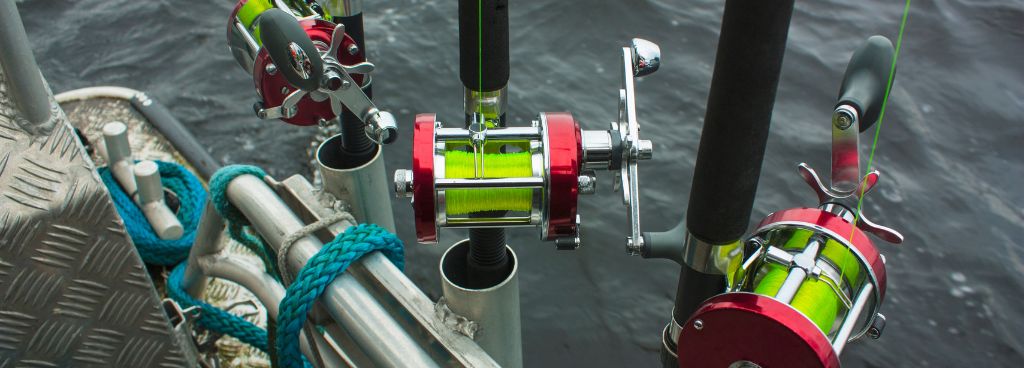Stories Worth Reeling In...
Last Updated on September 16, 2023
Have you ever wondered if WD-40, the popular multi-purpose lubricant, could be the solution to keep your fishing lines smooth and efficient? Many anglers have considered using WD-40 as a quick fix for their fishing gear, but is it really the right choice?
This blog post aims to debunk the common myth surrounding WD-40’s application on fishing lines and present you with safer and more effective alternatives for maintaining your fishing gear.
By the end of this post, you’ll be equipped with the knowledge to make the best choices for your fishing line maintenance and overall angling experience. Let’s dive in and discover the truth about using WD-40 on fishing lines!
Table of Contents
WD-40 has been a household name for decades, known for its versatility as a lubricant, penetrating oil, and rust inhibitor. Originally developed in 1953 to displace water and prevent corrosion in the aerospace industry, WD-40 quickly gained popularity and found its way into various households and industries. Its ability to loosen rusted bolts, lubricate moving parts, and protect metal surfaces has made it a go-to product for many DIY tasks.

The primary components of WD-40 include petroleum-based solvents, mineral oil, and various propellants. While these components are effective in their intended purposes, they may not be suitable for fishing lines. The solvents in WD-40 can potentially break down the molecular structure of fishing lines, leading to weakening and reduced line performance. The oily residue left behind by WD-40 might attract dirt and debris, negatively affecting casting and reel performance.
WD-40 is a degreaser, therefore it dissolves grease and oil. It should never be used to lubricate a reel. The general practice is to grease gears and oil everything else lightly. Excess grease and oil clog the spool and restrict casting distance.
While WD-40 is an effective lubricant and rust inhibitor for various applications, it is not suitable for use on fishing lines. The components in WD-40, such as petroleum-based solvents and oils, can have detrimental effects on fishing lines over time. These chemicals can weaken the line’s structural integrity, making it more susceptible to breakage and increasing the chances of losing a prized catch.
The oily residue left by WD-40 can attract dirt and debris, which can further contribute to line wear and decreased casting performance. WD-40 on fishing lines can compromise their durability and lead to disappointing results during fishing trips.
Aside from the potential harm to fishing lines, there are significant environmental concerns when using WD-40 near water sources. If applied to fishing lines, WD-40 can leach into the water, polluting the aquatic environment and posing risks to fish and other aquatic life. The chemicals in WD-40 are not environmentally friendly and can be harmful to aquatic ecosystems.
Let’s clear the air about the myth surrounding WD-40 and its supposed benefits for fishing lines. While some anglers may have heard about using WD-40 as a fishing line lubricant, it’s essential to separate fact from fiction and make informed decisions about caring for our fishing gear. Here’s the truth:
Addressing the misconception: Many anglers believe that using WD-40 on their fishing lines can improve casting distance, reduce friction, and enhance overall performance. Some even claim it can attract fish with its distinct scent. However, it’s crucial to understand that WD-40 is not designed or intended for use as a fishing line lubricant.
Evidence-based information: Fishing experts and reputable manufacturers advise against using WD-40 on fishing lines. The main components of WD-40, such as solvents and other chemicals, can potentially degrade the integrity of fishing lines over time. These chemicals may cause the line to weaken, lose tensile strength, and become more susceptible to breakage, jeopardizing the success of our fishing trips.
Fortunately, there are safer and more effective alternatives to WD-40 when it comes to fishing line maintenance. Many reputable fishing gear manufacturers offer specialized line conditioners and lubricants that are specifically designed to enhance the performance and lifespan of fishing lines.

Line conditioners come in various forms, including sprays, gels, and liquids, making them convenient and easy to apply to fishing lines. These alternatives are carefully crafted to reduce friction and protect fishing lines from wear and tear, resulting in smoother casting and improved durability during fishing sessions.
The use of line conditioners and specialized fishing gear lubricants offers several advantages that WD-40 cannot provide. Firstly, these products are specifically tailored to meet the unique demands of fishing lines, ensuring they do not cause any adverse effects or weaken the line’s strength.
These fishing line conditioners are often water-resistant, meaning they won’t wash off easily during fishing trips, providing ongoing protection and maintaining the fishing line’s longevity.
Responsible fishing practices go beyond gear maintenance. Anglers should be mindful of their impact on the environment and take steps to protect the waters they love. Properly disposing of fishing lines and other waste, respecting fishing regulations, and practicing catch-and-release whenever possible are essential for preserving our natural resources and ensuring a sustainable future for angling.
In conclusion, avoiding the use of WD-40 on fishing lines and embracing safer alternatives and responsible fishing practices will not only benefit the angler’s gear but also contribute to the conservation of our precious waterways. Let’s be stewards of the environment while enjoying the incredible experiences that fishing has to offer. Happy fishing!